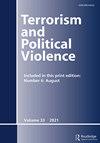The Climate Change–Terrorism Nexus: A Critical Literature Review
IF 2.1
2区 社会学
Q1 INTERNATIONAL RELATIONS
引用次数: 3
Abstract
ABSTRACT A growing number of policymakers around the world have recognized climate change as an escalating security threat and increasingly point to the climate change—terrorism nexus in particular. This critical literature review provides an analysis of the current state of research on the causal and correlative links between climate change, intermediary factors—such as resource scarcity, loss of economic opportunities, and instability—and terrorism in sub-Saharan Africa. Moving beyond a review of substantive themes within the existing body of scholarly research examining this topic, this article critically evaluates the theories, assumptions, and methods behind the literature. In doing so, the review identifies noteworthy trends, as well as gaps and shortcomings in the current research. Our review finds that the majority of the literature has observed a positive correlation between climate change and terrorism. More precisely, the current body of research overwhelmingly assesses that climate change indirectly leads to terrorism via its impact on conditions often considered to be drivers of terrorism in sub-Saharan Africa. Still, gaps remain in empirically backing up these assertions and examining the relationship between climate change, intermediary factors, and terrorism in more depth. We use our critical review and analysis to guide recommendations for further research into this emerging and timely field of study.气候变化与恐怖主义的关系:一个重要的文献综述
摘要世界各地越来越多的决策者已经认识到气候变化是一种不断升级的安全威胁,并越来越多地指出气候变化——尤其是恐怖主义的关系。这篇批评性文献综述分析了撒哈拉以南非洲气候变化、中介因素(如资源稀缺、经济机会丧失和不稳定)与恐怖主义之间的因果关系和相关联系的研究现状。本文超越了对现有学术研究中实质性主题的回顾,对文献背后的理论、假设和方法进行了批判性评估。在这样做的过程中,该综述确定了当前研究中值得注意的趋势以及差距和不足。我们的综述发现,大多数文献都观察到气候变化与恐怖主义之间存在正相关关系。更准确地说,目前的研究机构压倒性地评估说,气候变化通过对撒哈拉以南非洲经常被认为是恐怖主义驱动因素的条件的影响,间接导致了恐怖主义。尽管如此,在实证支持这些断言以及更深入地研究气候变化、中介因素和恐怖主义之间的关系方面仍然存在差距。我们利用我们的批判性审查和分析来指导对这一新兴且及时的研究领域进行进一步研究的建议。
本文章由计算机程序翻译,如有差异,请以英文原文为准。
求助全文
约1分钟内获得全文
求助全文
来源期刊

Terrorism and Political Violence
Multiple-
CiteScore
5.60
自引率
8.30%
发文量
87
期刊介绍:
Terrorism and Political Violence advances scholarship on a broad range of issues associated with terrorism and political violence, including subjects such as: the political meaning of terrorist activity, violence by rebels and by states, the links between political violence and organized crime, protest, rebellion, revolution, the influence of social networks, and the impact on human rights. The journal draws upon many disciplines and theoretical perspectives as well as comparative approaches to provide some of the most groundbreaking work in a field that has hitherto lacked rigour. Terrorism and Political Violence features symposia and edited volumes to cover an important topic in depth. Subjects have included: terrorism and public policy; religion and violence; political parties and terrorism; technology and terrorism; and right-wing terrorism. The journal is essential reading for all academics, decision-makers, and security specialists concerned with understanding political violence.
 求助内容:
求助内容: 应助结果提醒方式:
应助结果提醒方式:


